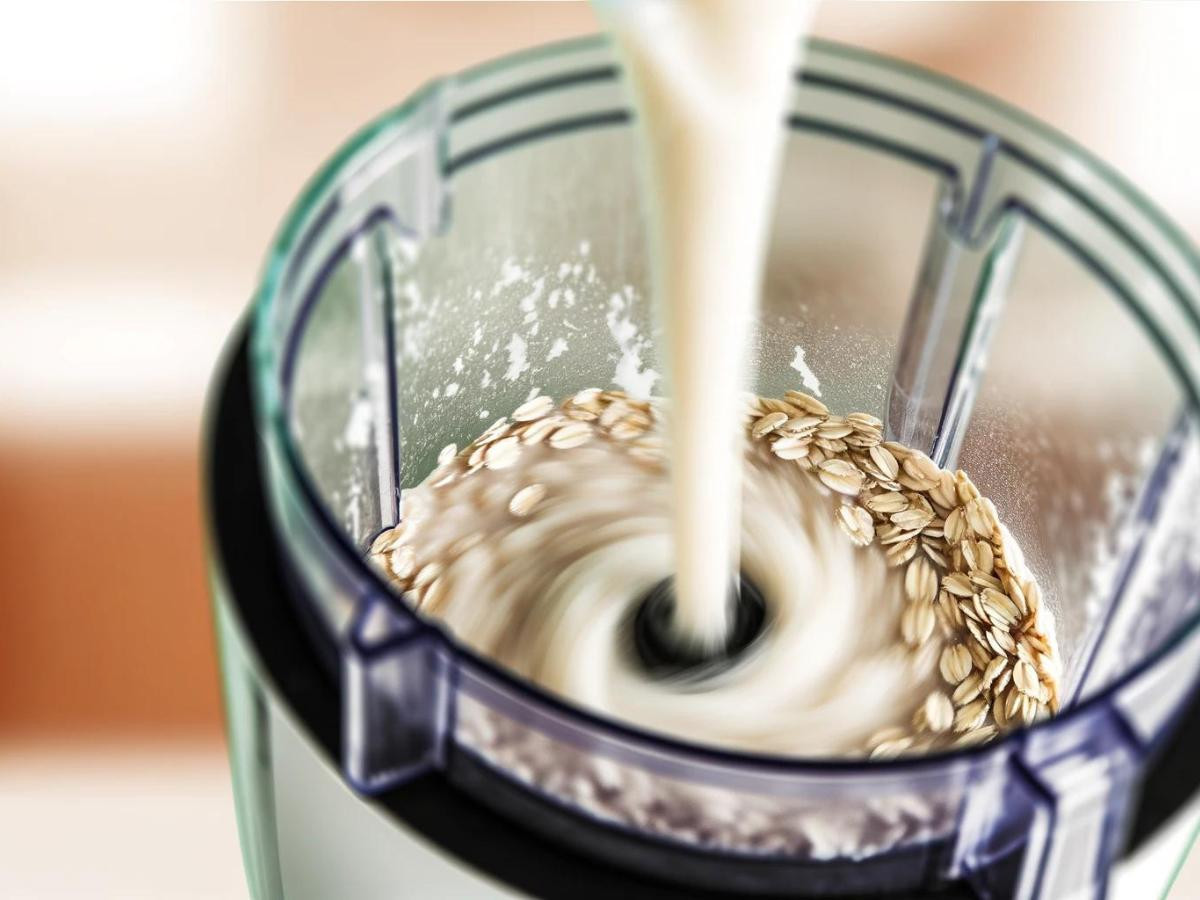Can Oat Milk Cause Diarrhea? Results of Consuming Oat Milk
In recent years, oat milk has surged in popularity as a creamy, sustainable alternative to dairy milk. Its pleasant taste and versatility have made it a favorite among coffee enthusiasts, smoothie lovers, and health-conscious individuals. But with its rise in popularity comes a pressing question: Does oat milk make you poop? We have it all, plus the benefits and potential risks of drinking oat milk.

Let’s get one thing clear right off the bat—talking about bowel movements isn’t precisely cocktail party chatter. We’re all friends here, and it’s a question that’s got many of us scratching our heads (and maybe planning the quickest route to the nearest restroom).
Who knew that blending oats and water could stir up such a storm in the world of dairy alternatives? Along with soy milk and almond milk, this is like the cool newcomer everyone wants to be friends with—in your coffee, over cereal, or just a straight-up glass of the stuff.
But amidst the clinking of glasses and the frothing of lattes, a rather pressing question bubbles: Does oat milk products affect your digestive dance? Or more to the point, Does Oat Milk make you poop?
So, in the spirit of discovery and warm toilet seats (because I’ve walked the path of plant-based milk curiosity myself), let’s dive into this.
We’ll look at why oat milk might have you visiting the bathroom more often or, conversely, why it might not sit well with some of us.
Table of Contents
Does Oat milk make you poop?
Armed with personal experience and a dash of science, let’s explore the ins and outs of oat milk and its journey through our guts and digestive tract.
No fluff, soy-free, just the good stuff—you and me, on a quest for the truth about oat milk and bowel movements.
What is Oat Milk?

Oat milk’s rise from a humble plant-based alternative to a coffee shop darling is nothing short of impressive.
But before we get into the nitty-gritty of its effects on our digestive systems, let’s take a moment to appreciate what oat milk is.
The Basics:
Origin: Oat milk is a concoction made by soaking oats in water, blending them, and then straining the oat and water mixture to separate the liquid from the oat pulp. You’re left with a creamy texture and slightly sweet liquid begging to be poured into your morning cup of Joe.
Nutrition: It’s not just water and oats in a fancy disguise. Oat milk is a nutritional powerhouse in its own right, boasting a good mix of carbohydrates, proteins, and, crucially, fibers. It’s often fortified with vitamins and minerals like calcium, vitamin D, and riboflavin, making it a contender in the nutrition ring against its dairy and non-dairy rivals.
Why It Matters:
Fiber Content: Unlike many of its non-dairy siblings, oat milk has a notable amount of dietary
Fiber. This is where things start to get interesting for our digestive tracts. The soluble fiber in oat milk, known as beta-glucan, is a bit of a superstar. It has the potential to regulate digestion, maintain heart health, and even keep blood sugar levels in check.
Gluten-Free (Sometimes): For the gluten-averse among us, it’s crucial to note that oats are naturally gluten-free; they can be contaminated during processing. However, many brands offer gluten-free oat milk, catering to those with celiac disease or gluten sensitivities.
The Role of Fiber in Digestion

Understanding oat milk’s impact on our digestive system requires a quick dive into the world of fiber. It’s not the most glamorous topic, but it plays a pivotal role in our health. Let’s break it down, shall we?
Fiber 101:
Types of Fiber: There are two main types of fiber – soluble and insoluble. Soluble fiber dissolves in water, forming a gel-like substance that can help soften stool, making it easier to pass. Insoluble fiber, on the other hand, adds some solids to your stool and can help things move more quickly through your stomach and intestines.
Oat Milk’s Fiber: Oat milk contains soluble fiber, particularly beta-glucan. This type of fiber is a bit of a multitasker—it not only aids in digestion but also lowers cholesterol and regulates blood sugar levels.
Why It’s Important:
Digestive Benefits: Soluble fiber from oat milk can help maintain a healthy digestive system by promoting regular bowel movements. Incorporating soluble fiber into our diet can be a game-changer for those who’ve experienced the dreaded bloat or the discomfort of constipation.
Heart Health and Beyond: Besides its digestive benefits, the soluble fiber in oat milk can contribute to heart health by lowering bad cholesterol levels. It’s like a double win for your health!
The Takeaway:
Fiber might not be the flashiest nutrient on the block, but its impact on our health is undeniable. The soluble fiber content of oat milk is a significant player in why this dairy alternative is worth adding to your diet, especially if you want to support your digestive health.
Oat Milk and Bowel Movements

Now, onto the question that’s been brewing in our minds: Does oat milk make you poop? The straightforward answer is it can, thanks to its soluble fiber content, specifically beta-glucan.
But as with most things related to our bodies, it’s more nuanced than a simple yes or no. Let’s sift through the facts.
The Digestive Boost:
Soluble Fiber Magic: The beta-glucan in oat milk absorbs water, helping to soften stool and support smoother bowel movements. This means that oat milk can gently encourage regularity and reduce the discomfort of constipation for many.
Gut Health Support: Beyond just aiding in poop production, the soluble fiber in oat milk feeds the good bacteria in our gut. A happy gut microbiome is crucial for digestion and overall health.
Potential Side Effects:
While oat milk can be a digestive hero for some, it’s not without its caveats. Here’s why it might not be the bowel buddy everyone’s looking for:
FODMAPs: Oat milk might be more of a foe for folks sensitive to FODMAPs. FODMAPs can lead to increased gas, bloating, and even diarrhea in some people, particularly those with IBS (Irritable Bowel Syndrome).
Volume Matters: Like any good thing, moderation is key. Downing large amounts of oat milk (tempting as it may be) can lead to digestive discomfort for some simply due to its fiber content.
The Bottom Line: Oat milk, with its soluble fiber content, can promote healthier bowel movements and improve digestive health for many.
Yet, it’s essential to listen to your body and adjust your intake accordingly, especially if you have a sensitive digestive system or are prone to FODMAP-related discomfort.
Potential Risks and Side Effects

While oat milk can be a digestive cheerleader for many, it’s not a one-size-fits-all solution. Just as our taste in coffee varies (single-origin, anyone?), so does our body’s response to different foods and beverages.
Let’s address the elephant in the room: the potential risks and side effects associated with oat milk consumption.
FODMAP Awareness:
The FODMAP Factor: Oats are part of the FODMAP family, which can be troublesome for those with sensitive digestive systems, such as those with Irritable Bowel Syndrome (IBS). Oat milk might trigger symptoms like bloating, gas, and diarrhea for these individuals.
Individual Thresholds: Sensitivity to FODMAPs varies widely among individuals. Some might handle a small cup of oat milk just fine, while others might experience discomfort from even a splash in their coffee.
Allergies and Sensitivities:
Gluten Cross-Contamination: While oats are naturally gluten-free, they’re often processed in facilities that handle wheat, barley, and rye, leading to cross-contamination. For those with celiac disease or non-celiac gluten sensitivity, it’s crucial to choose oat milk that’s certified gluten-free.
Additives and Sweeteners: Some oat milk brands add extra ingredients for flavor, consistency, or shelf life, as well as artificial sweeteners. These additives might not please everyone, especially those with specific food sensitivities or allergies.
Moderation is Key:
Finding Your Balance: Starting with small amounts of oat milk and gradually increasing your intake can help gauge your body’s response. It’s all about finding that sweet spot to enjoy its benefits without tipping the digestive scale.
Listening to Your Body: Our bodies are pretty good at giving us feedback—sometimes subtly, sometimes not. Paying attention to how you feel after consuming oat milk can help you make the best choice for your gut health.
The Bottom Line: Oat milk, like any food or drink, comes with its considerations. While it offers benefits, particularly regarding digestion and nutrition, it has potential drawbacks.
Being mindful of how oat milk affects you personally is key to incorporating it into a balanced diet.
Wrapping It Up: Drinking Oat Milk

We’ve traveled through the creamy, dreamy landscape of oat milk, from its nutritional highlights to its role in our digestive ballet.
It’s clear that, in conclusion, oat milk can be a delightful addition to our diets, offering not just a plant-based milk alternative but a host of digestive benefits thanks to its dietary fiber content.
However, as with any dietary choice, the key to harmony is understanding how it fits into your unique digestive story.
Recap of the Key Takeaways:
Fiber-Filled Friend: Oat milk’s soluble fiber, beta-glucan, is the star of the show. It potentially aids in smoother bowel movements and supports overall gut health.
Individual Responses Vary: Just as our palates differ, so do our digestive systems. Oat milk can be a gentle aid for some, while for others, it might be a source of discomfort, particularly for those with FODMAP sensitivities or gluten intolerance.
Moderation and Mindfulness: Starting with small servings and observing how your body responds can help you incorporate oat milk into your diet without digestive drama.
Looking Forward: As we continue to explore the vast and varied world of food and nutrition, oat milk stands out as a testament to the innovation and adaptability of plant-based alternatives.
Whether you’re a die-hard dairy lover testing the waters of plant-based milk or a seasoned vegan searching for the perfect coffee complement, oat milk offers a versatile and nutritious option worth considering.
Embrace Your Dietary Journey:
Stay Curious: The world of food is vast and ever-changing. Keep an open mind and a willing palate as you explore new options.
Health First: Always prioritize your health and well-being, making choices that align with your nutritional needs and personal health goals.
Share Your Stories: Just as I’ve shared my oat milk adventures with you, don’t hesitate to share your experiences with others. We all benefit from the collective wisdom of our food journeys.
As we close this chapter on oat milk and its intriguing role in our digestive health, remember that the journey to understanding our bodies and their needs is ongoing.
Whether oat milk becomes a staple in your diet or just a passing guest, it’s one more step toward discovering what makes you feel your best.
FAQ and Additional Information
Is oat milk a good laxative?

Oat milk can be considered a mild, natural laxative due to its soluble fiber content, specifically beta-glucan. This type of fiber absorbs water, helping to soften stools and promote easier bowel movements, aiding in mild constipation relief.
However, it’s not as potent as traditional laxatives and should be considered part of an overall diet supporting digestive health. Oat milk might not be suitable for those with specific digestive conditions like IBS due to its FODMAP content, which can cause discomfort for some.
As with any dietary change intended to impact digestive health, it’s best to start with small amounts and monitor your body’s response.
Can oat milk cause digestive issues?

Yes, oat milk can cause digestive issues for some individuals, particularly those with Irritable Bowel Syndrome (IBS) or sensitivities to FODMAPs. Oats, the primary ingredient in oat milk, are a source of FODMAPs—fermentable carbohydrates that can lead to symptoms like bloating, gas, and altered bowel movements in sensitive individuals.
While oat milk offers health benefits, including being a good source of soluble fiber, people with IBS or FODMAP sensitivities need to consume it cautiously or choose a low-FODMAP alternative if they notice that oat milk triggers their symptoms.
Is oat milk OK when you have diarrhea?

Commercial Oat milk, with its soluble fiber content, particularly beta-glucan, can help regulate digestion and support gut health. However, during episodes of diarrhea, it’s generally recommended to follow a BRAT diet (Bananas, Rice, Applesauce, Toast) or consume foods that are easier on the digestive system.
While oat or rice milk is not inherently harmful during diarrhea, its fiber content can potentially exacerbate symptoms for some individuals, especially if they have a sensitivity to FODMAPs, which are present in oats.
Therefore, once symptoms have subsided, it may be best to gradually introduce oat milk back into the diet and monitor how your body responds. If diarrhea persists, consult a healthcare provider.
Can oat milk aggravate IBS?
Oat milk disadvantages can potentially aggravate IBS (Irritable Bowel Syndrome) in some individuals, primarily due to its content of FODMAPs (Fermentable Oligo-, Di-, Mono-saccharides And Polyols).
These carbohydrates can be difficult to digest for people with IBS, leading to symptoms such as bloating, gas, and diarrhea.
While the soluble fiber in oat milk is beneficial for many, it can also contribute to these symptoms in sensitive individuals. Those with IBS need to monitor their response to oat milk diarrhea and consult with a healthcare professional to tailor their diet appropriately.
For some, opting for low-FODMAP milk alternatives or limiting the amount of oat milk consumed may be necessary to manage symptoms effectively.







